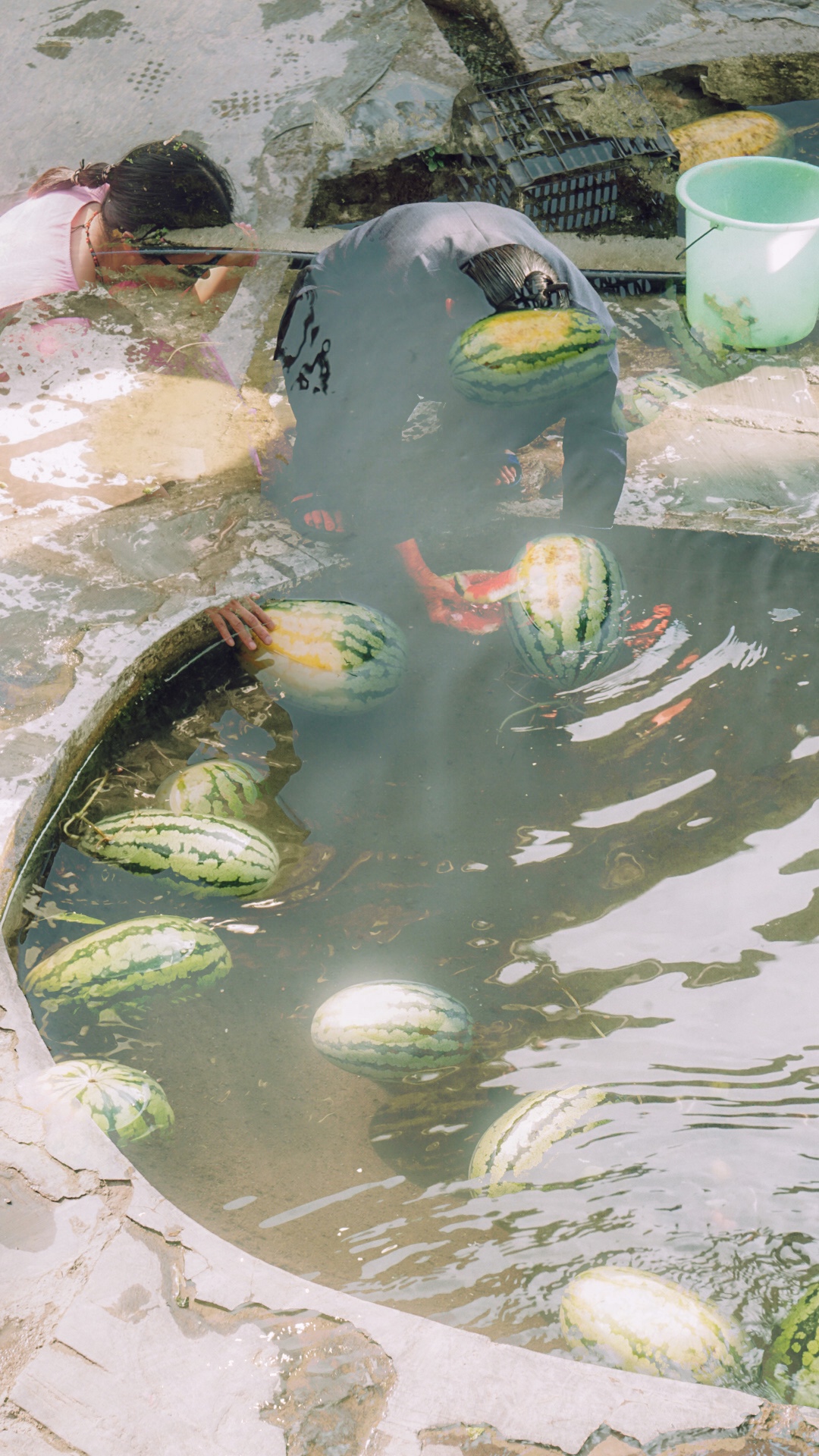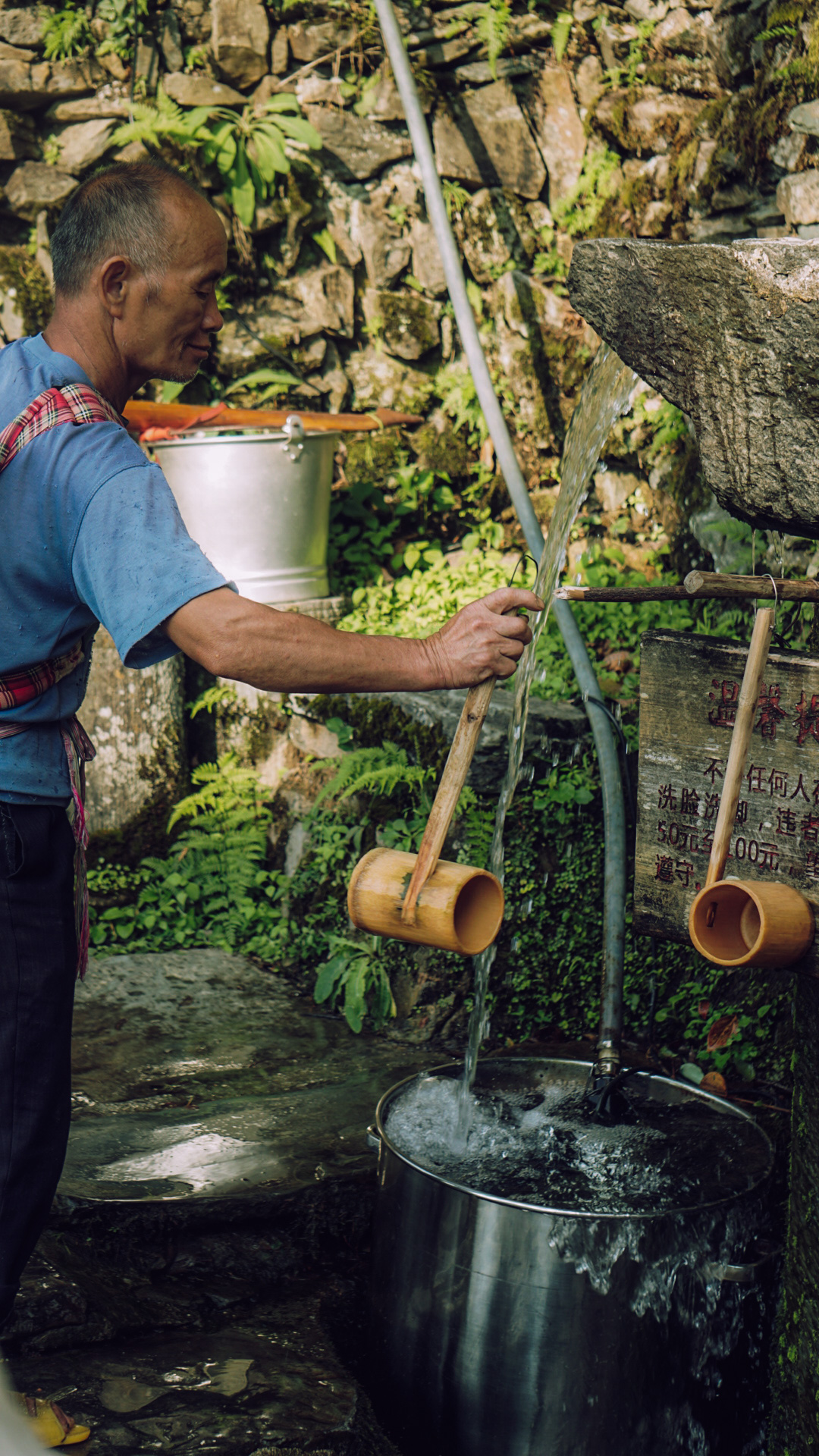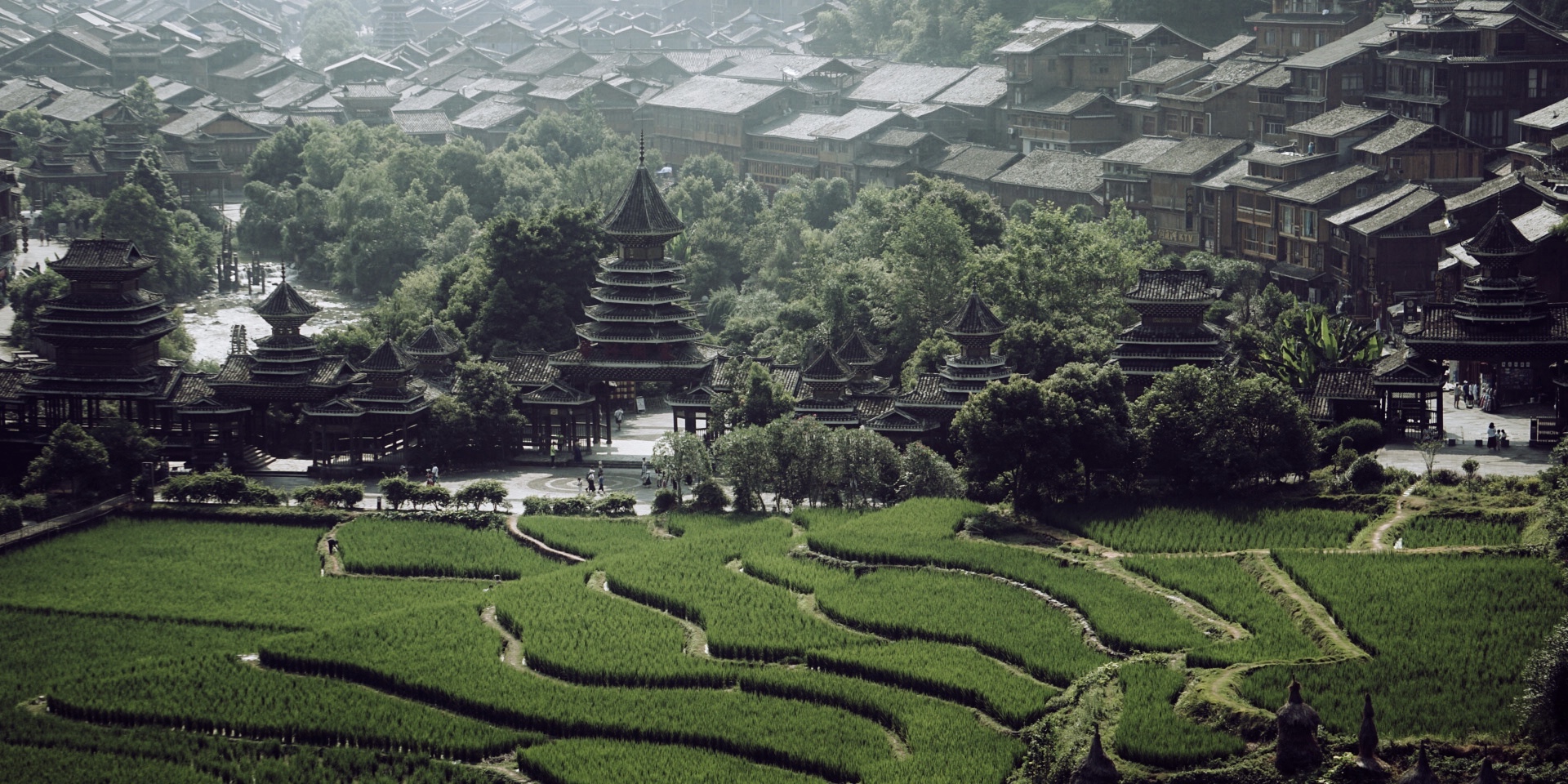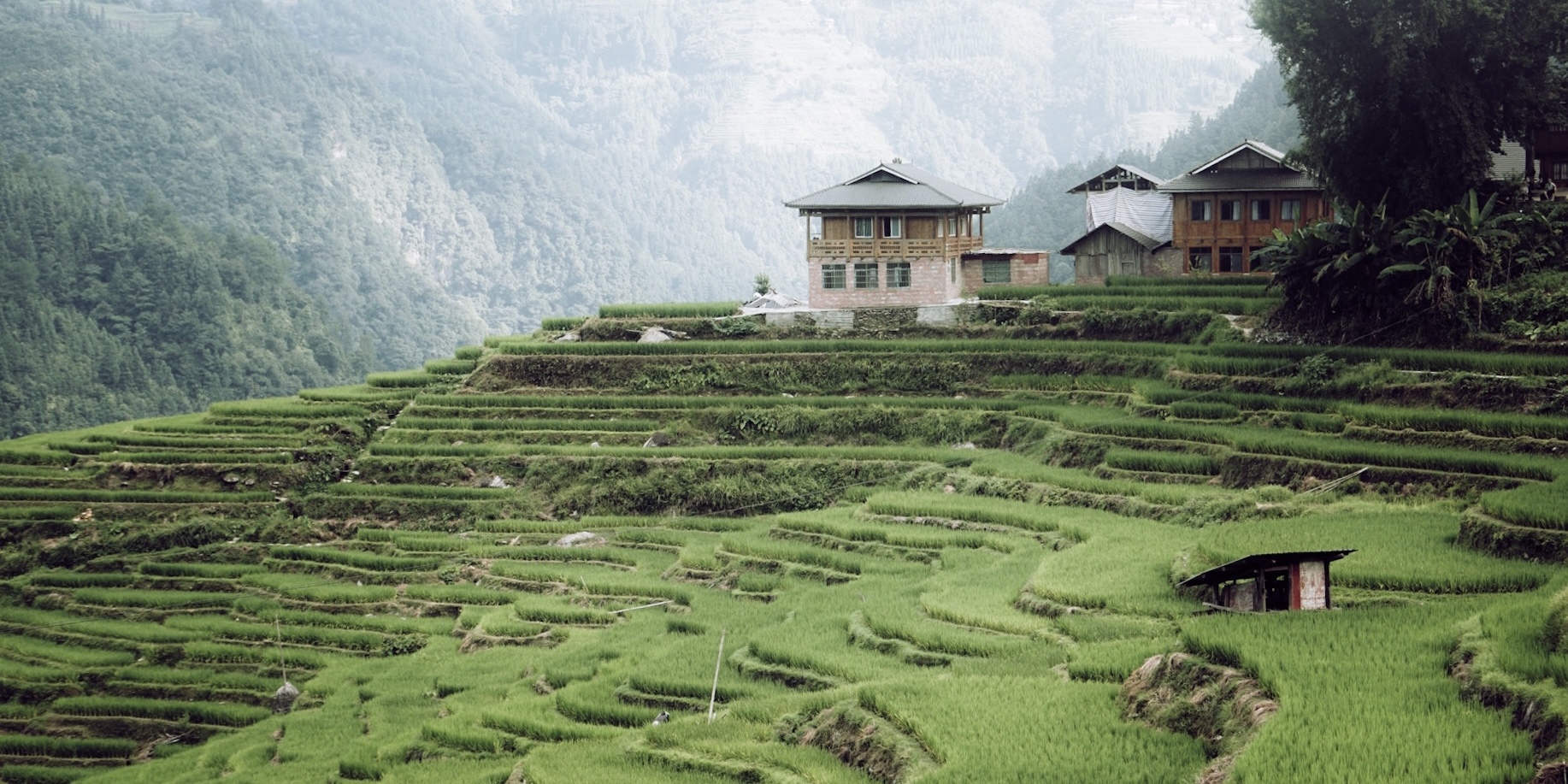Rongjiang Terraced Fields
2022年夏天,我们一家深入贵州黔东南自治州腹地,造访了苗侗人家聚居的榕江群岭,偶然记录下深山中、梯田上飘过的「民谣」。
In the summer vacation of 2022, I made my trip to Rongjiang County, Guizhou Province, Southwest China, to document the endemic “ballads” on terraced fields of the Hmong (Miao) and Gaeml (Dong) people.
首要目的地加榜村僻处绝岭,世代为苗家故园。前往加榜的路程并不通畅,从榕江高铁站下车后,我们先在县城汽车站买了乡下客车的票,再在车站旁的小饭馆匆匆吃过午饭。巧的是我们小巴的司机也在店里吃饭,和他交流中才得知,接下来我们还要在车上捱三个小时,才能抵达加榜梯田——真不愧是僻境中的僻境。
Jiabang is a traditional Hmong settlement situated in remote mountains. Having arrived in the township of Rongjiang by rail, where the county authority affiliated with Qiandongnan Miao and Dong Autonomous Prefecture is located, we booked additional shuttle tickets bound for Jiabang Village. During a short break for a quick lunch at the bus station, we happened to encounter the shuttle driver, from whom we just figured out there was still a three-hour ride to our ultimate destination – authentically the periphery of peripheries.
小巴车窗外掠过的风景被阳光白灼得厉害,看得人晕头转向。开了冷气的车厢里弥漫着恶心的汽油味,闻久了让人出不上来气。每隔一阵子,车会在各村庄口的风雨桥边停下,翻江倒海的颠簸才稍稍冷静片刻,接着便有穿着民族服装的妇女、上下学的小孩、挑着担子赶场的农民拥上车来。车里有来有回的土话松软地织成交谈、车外的稻田涌动起刺眼的绿浪,车程一味地昏昏欲睡。恍惚间,公路一猛子杀入群山间的峡谷,隔着车窗远远望见一道道闪光的棱线,才知道加榜梯田的轮廓已从光晕中浮现。
The sunlit sight outside the window was dizzily scintillating, and the sealed air-conditioned cabin was fraught with gasoline effluvium, mawkish and suffocating. From time to time, the unremitting queasy jolts would temporarily calm when the driver pulled over at some symbolic village entrances (normally in bridge forms referred to as Fengyuqiao in Chinese) to pick up grouped middle-aged ladies in ethnic costumes, the schoolchildren and the villagers carrying loads to the fair. After a somnolent journey accompanied by conversations in elusive dialect and paddy fieldscapes in saturated green all along the way, the road abruptly twisted into a chasm between stretches of mountains. Far away along the sparkling contours of the ranges, finally, I caught sight of the sunbathing silhouette of Jiabang Terraced Fields.
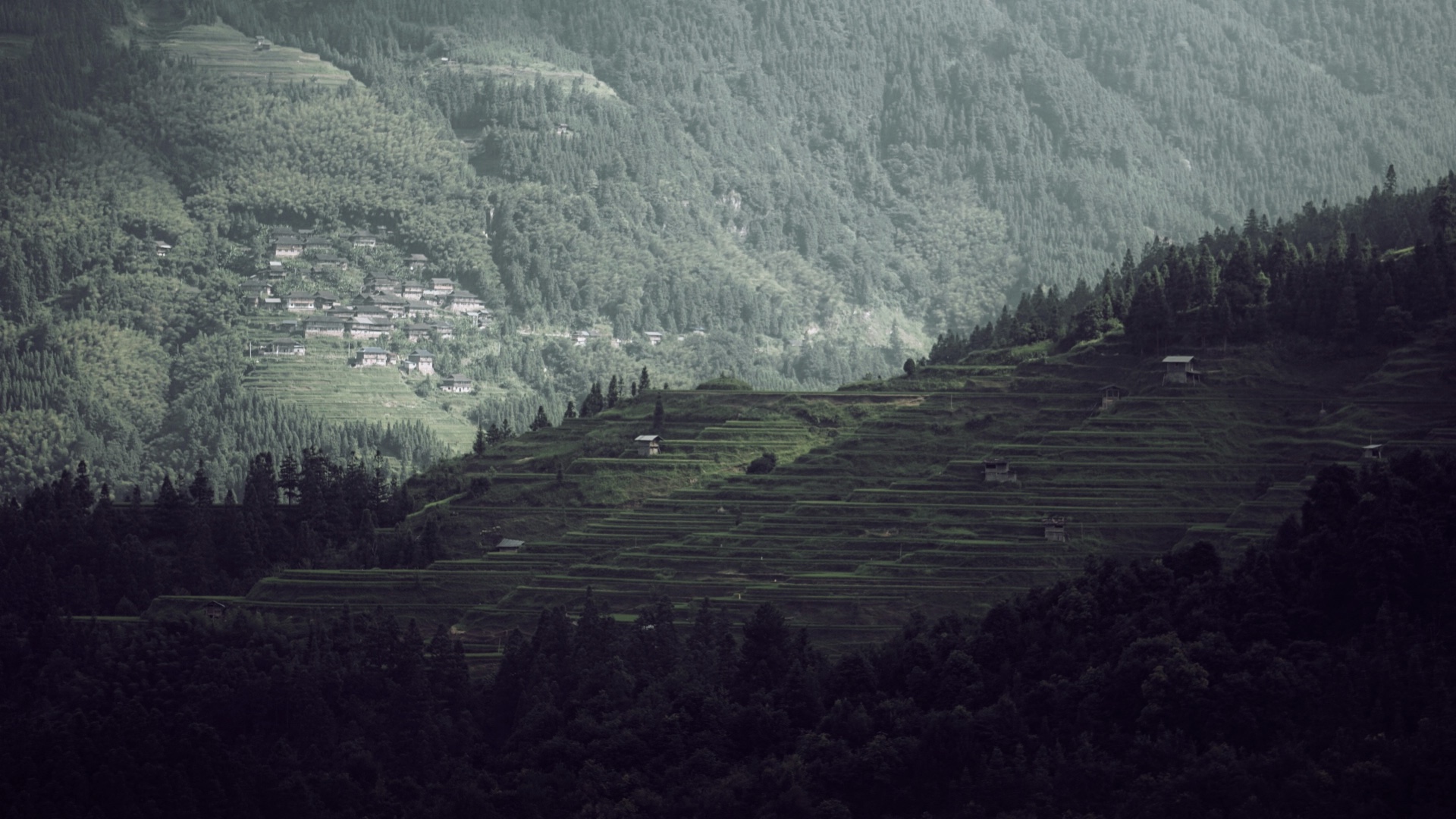
我们抵达时已近黄昏,一道斜阳没精打采地映在田坎上,于深谷两岸的村庄上静静地显现出一面略显忧郁的阴影和一块气定神闲的光斑。
It was near dusk upon our eventual arrival. A lackadaisical beam of inclined sunshine was projected onto the field terraces, causing a contrast between the melancholy shadow and the sanguine corner in tranquil exposure on the mountainous villages across the deep valley.


结束一天劳作的农民扛着农具,渡过层层麦浪的绿野,走回家去,而我的视线就这样默默跟着他们的足迹,从不远处的田垄慢慢移向远处的农宅,又突然凝止于独自卧在发光田线上的小木屋。我视野里的一切都散发出不真实的光晕,而在这层似真似幻的光晕之下,掩藏着一场即将到来的暴雨。
Farmers who had finished their work of the day were staggering through green shoots of paddies, carrying their implements home. My sight was silently tracing their trajectories from down the terraces nearby to the distant houses, and suddenly anchored to a solitary cottage above the coruscating field horizon – everything within my view was shining in a surreal pattern, ingenuously obfuscating the harbinger of the imminent evening shower.
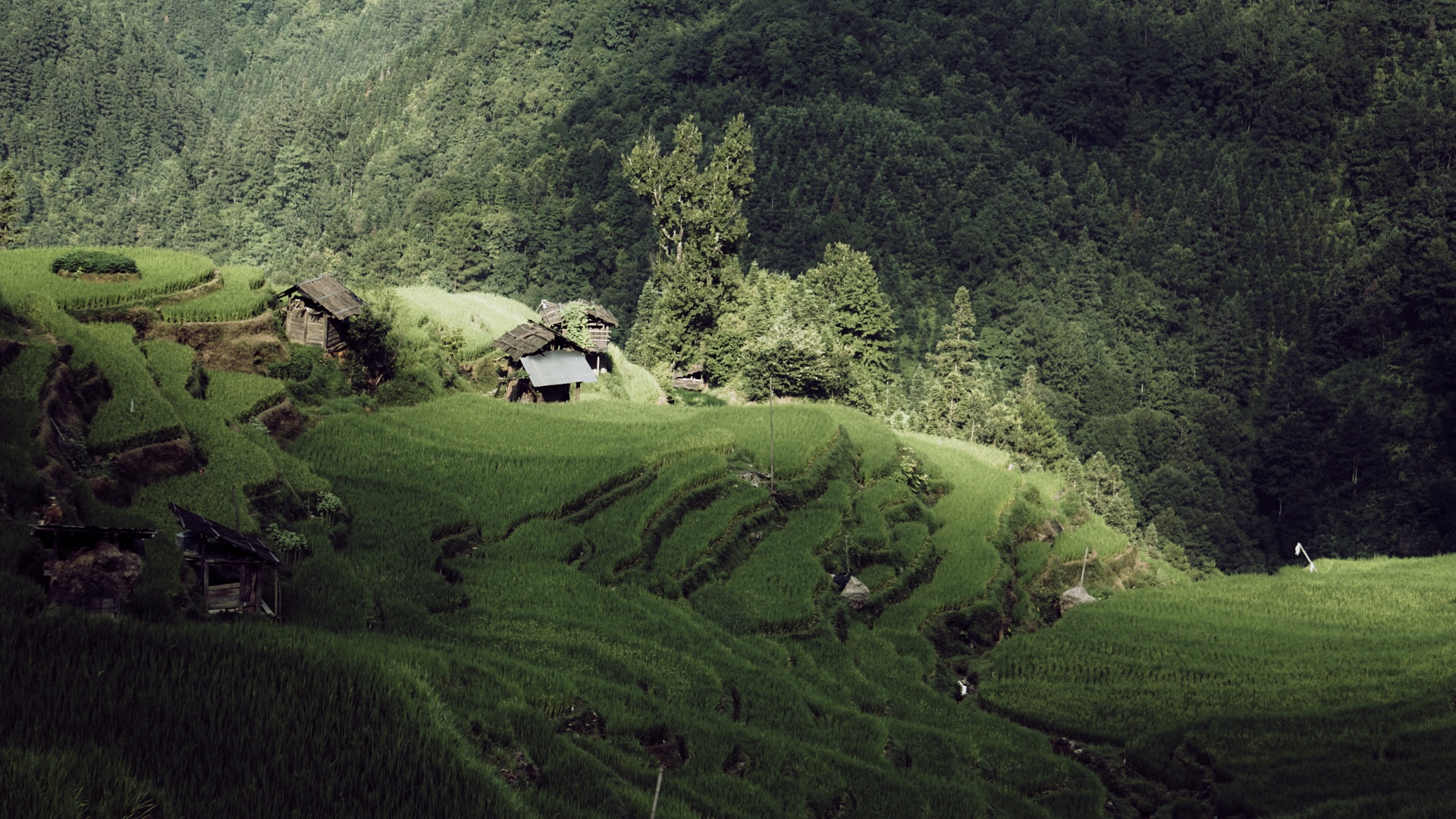
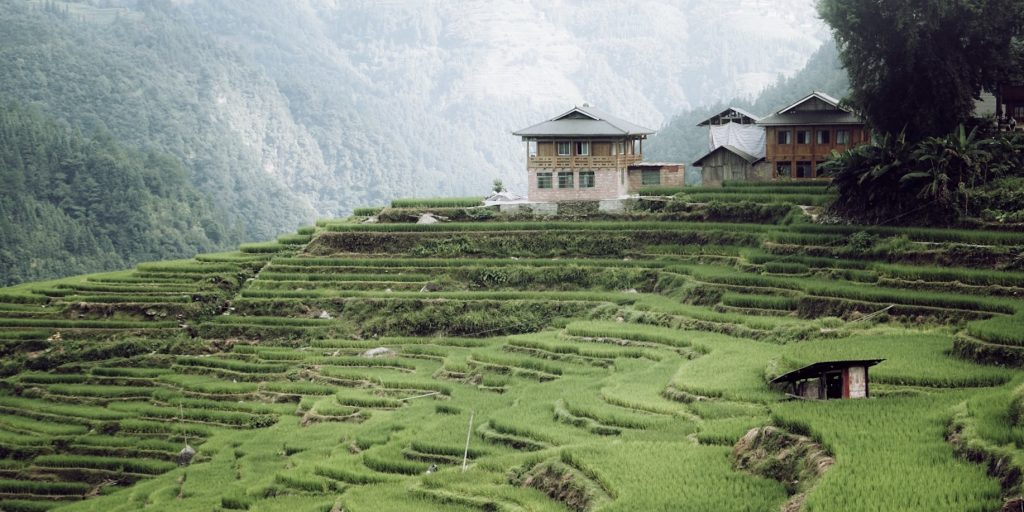
加榜梯田的偏僻位置,加之村民们对旅游业盈利前景的漠然,共同保留下加榜不受纷扰的原真,但落到个体头上,倒也让我这样的远客多走了不少山路、挨了不少饿、找不到多少像样的饭馆。不过好在我们在疲惫难耐之际,终于侥幸找到一家当地苗族夫妻开的家庭饭店——顾名思义,饭厅直接就是他们家一层紧挨着公路的客厅。男主人只会说一丁点普通话,女主人更是没接受过汉话教育,我们只好一边打着手势,一边卖力地说着最简单的词语,期待着对方最基本的理解。当我们好不容易坐在餐桌边准备吃晚饭,房间的木屋顶突然闷闷地嘟囔起来,饭厅大门外的夜色紧接着被噼里啪啦的雨点撕碎成流动的银线,一场大暴雨骤然袭来。随之而来的意外停电更是将神秘难言的晚餐推向了戏剧性的高潮——在众人的惊呼声中,悬挂在饭厅天花板上的唯一一颗电灯泡咔嚓熄灭,主人家急忙燃起一支蜡烛,用烛泪将它粘在我们桌上,而我们兴致盎然,在这时间统治之外的雨夜幽暗中聊起了天。
The peripheral location in the underprivileged hinterland and the locals’ insouciance over lucrative tourism coincidentally preserved the unperturbed nature of Jiabang, but meanwhile, also kept me walking along the village road, starving and having difficulty finding even a villager restaurant. Fortunately, we culminated the arduous journey with the wonderful finding of a family restaurant of an indigenous Hmong couple – literally, we were served in their living room which forthrightly faced the road. The host could understand only a few Mandarin sentences, while the hostess had even not received Mandarin education, so we could do nothing but gesticulate and murmur elementary words in hope of her apprehension. Immediately at the moment when we settled down for dinner, the wooden rooftop started whining in an oppressive tone, and the scenery outside the door was completely torn into glistening strips by the cracking raindrops. Furthermore, the occult dinner was pushed to its zenith at an accidental power failure – in our exclaims, the only bulb suspended from the ceiling quenched its light. The host soon lit a candle and glued it to the wax drips on the table, while we started rambling on with great interest in this “timeless dark rainy night”.
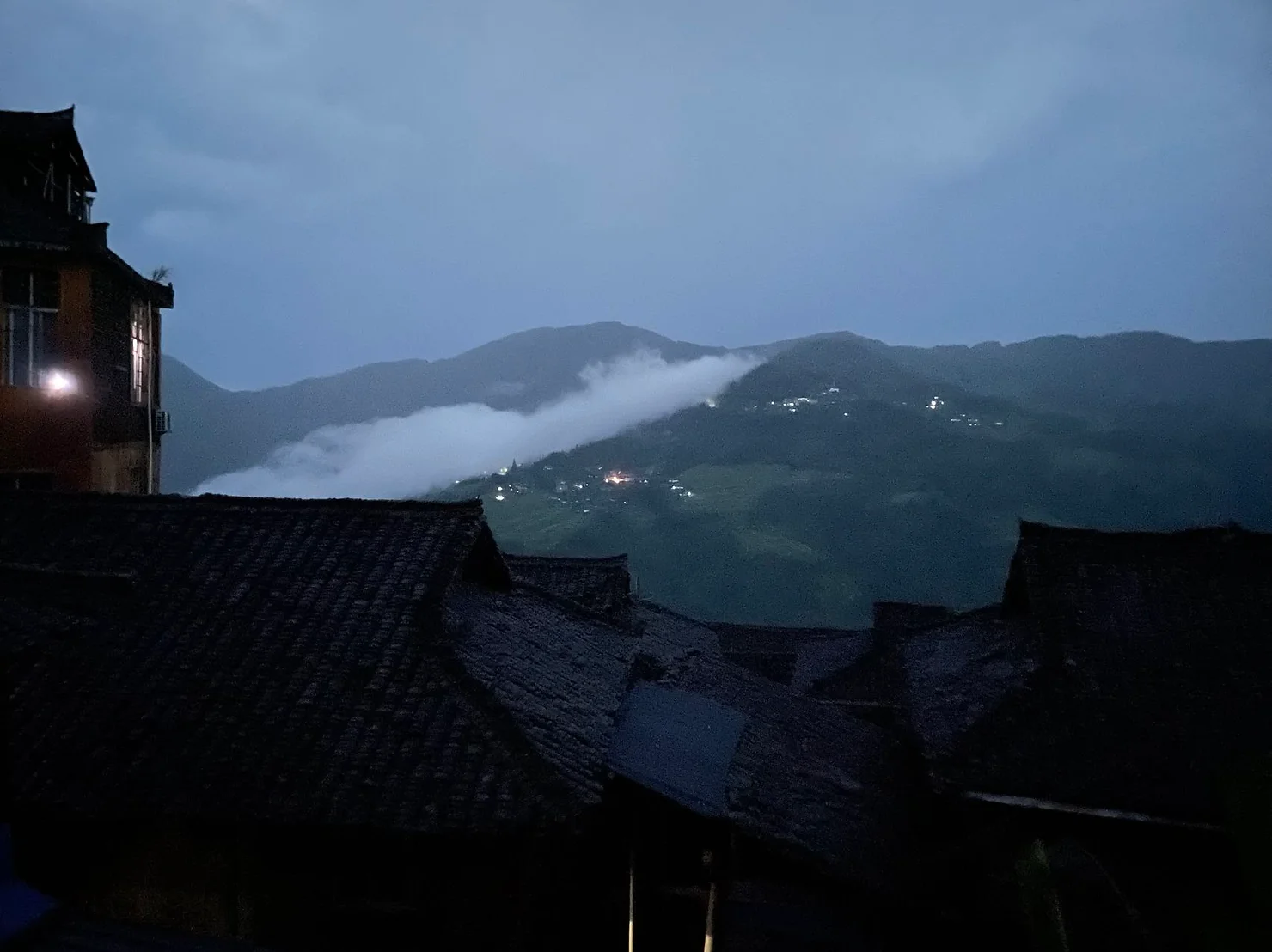
雨渐小,我们搬出凳子坐在公路边的院坝上,眼瞅着男主人抽起长烟,听着他和我民族学专业的老爸聊起稀奇古怪的苗族传说和仪式。
As the storm dwindled, we went out to the doorway yard, seated, gazing at the host smoking the slender bong, and listening to his talk with my father, an ethnologist, about the numinous Hmong tales and rituals.
「我听说你们苗族每个人出生时,家里都会种一棵树,这棵树只会在那个人死后被砍下做棺材,」我爸带着好奇心问道。
“I’ve heard a tree would be planted at the time when any of your people was born, and would be cut down decades later to make the coffin for the individual,” my father asked with curiosity.
「不会,」男主人露出尴尬的微笑,用笨拙的汉话回答道,「那就是一些苗寨为了吸引游客编的玩意。」
“No,” the host smiled awkwardly and answered in gawky Mandarin, “that’s a gimmick made by some Hmong villages to appeal to tourists.”
「倒是真的每个寨子都有一个巫师,负责村里人结婚呀,葬礼呀,这类重要仪式,」他继续说道,「但我们不会像你们汉族人一样在意风水,不会找他看风水选宅址。」
But we indeed have a village shaman in charge of our momentous rituals, like weddings and burials,” he went on, “though we don’t select our house site in accordance with his word, just as Fengshui that you Han people usually care.”
对话散漫地游走在雨后澄澈的星穹下,在谈话两方的一旁坐着一个摩托车旅行家,他从遥远的北方一路南下,骑行上下公里进入这僻远的桃源。再一旁是我们路上偶遇的几位女游客,正有一茬没一茬地聊着鸡毛蒜皮,为星夜下的无稽之谈撒上佐料。
The whole conversation was being loosely weaved beneath the limpid star-ornamented vault of heaven after the shower. Alongside the two interlocutors was seated a free motorcyclist who had ridden thousands of miles from North China down to this remote southwestern mountain village, and several ladies we encountered on the journey and grouped with were additionally scattering their discursive seasonings onto this back-and-forth balderdash.
我迫不及待地端着相机和三脚架爬上民宿顶层的露天阳台,设置好弱光环境下的拍摄参数,将镜头直指银河所在的位置,按下快门,期待着一张迷人的星空杰作。然而现实不遂人意,相机只捕捉到了夜空里一只飞蚊飘荡过的痕迹,尽管它莫名优雅,酷似星轨。
I couldn’t wait to carry my camera and tripod to the open-air balcony of our hostel, and attuned the shooting parameters to the dim environment at midnight. Having oriented the lens straight to the position where supposedly the Galaxy was, I pressed the shutter with the expectation of a photographic masterpiece of the enchanting starry sky. However, the outcome turned out a little below my anticipation, only capturing the ghostly movement of a passing mosquito – luckily, at least it was verisimilar to an elegant star trail though 🙂

次日,我们离开加榜,启程前往另一个侗族村寨堂安。堂安同样以梯田美景久负盛名,但有加榜珠玉在前,我们似乎再难被类似的景象打动,于是避开簇拥在山腰梯田观景台的人群,直奔山顶的村寨。
The next day, we set off again to Tangan, another Gaeml habitation equally well known for its terraced fields. With the breathtaking landscape of Jiabang in mind, we seemed to be hardly thrilled once more by the similar sceneries. So we shunned the crowds of visitors flocking around the viewing platform on the hillside and headed straight to the center of the village on the top.
村寨正中央是全村的宗教仪式建筑——侗族鼓楼。除了每年的大型活动外,这座标志性的建筑也充当着人们日常社交的活动中心。徜徉在鼓楼齿状檐线之下的阴影里时,清晰可见休息的村民自然而然地分成了两队——男人们围坐打牌,女人们坐在另一端叫卖自家种的水果蔬菜——但他们都不约而同地仰头看向我们,注视着这几个「鬼鬼祟祟」的外人。
In the core of the village was the religious and ceremonial drum tower for all Gaeml residents of Tangan. Other than annual rites, this emblematic architectural structure was normally the everyday community center for villagers. As we wandered around under the dentate eaves, the two elderly groups – the male one seated in a circle, playing cards, and the female one seated at the other side, hawking homegrown fruits and crops – simultaneously looked up at us, the furtive strangers.
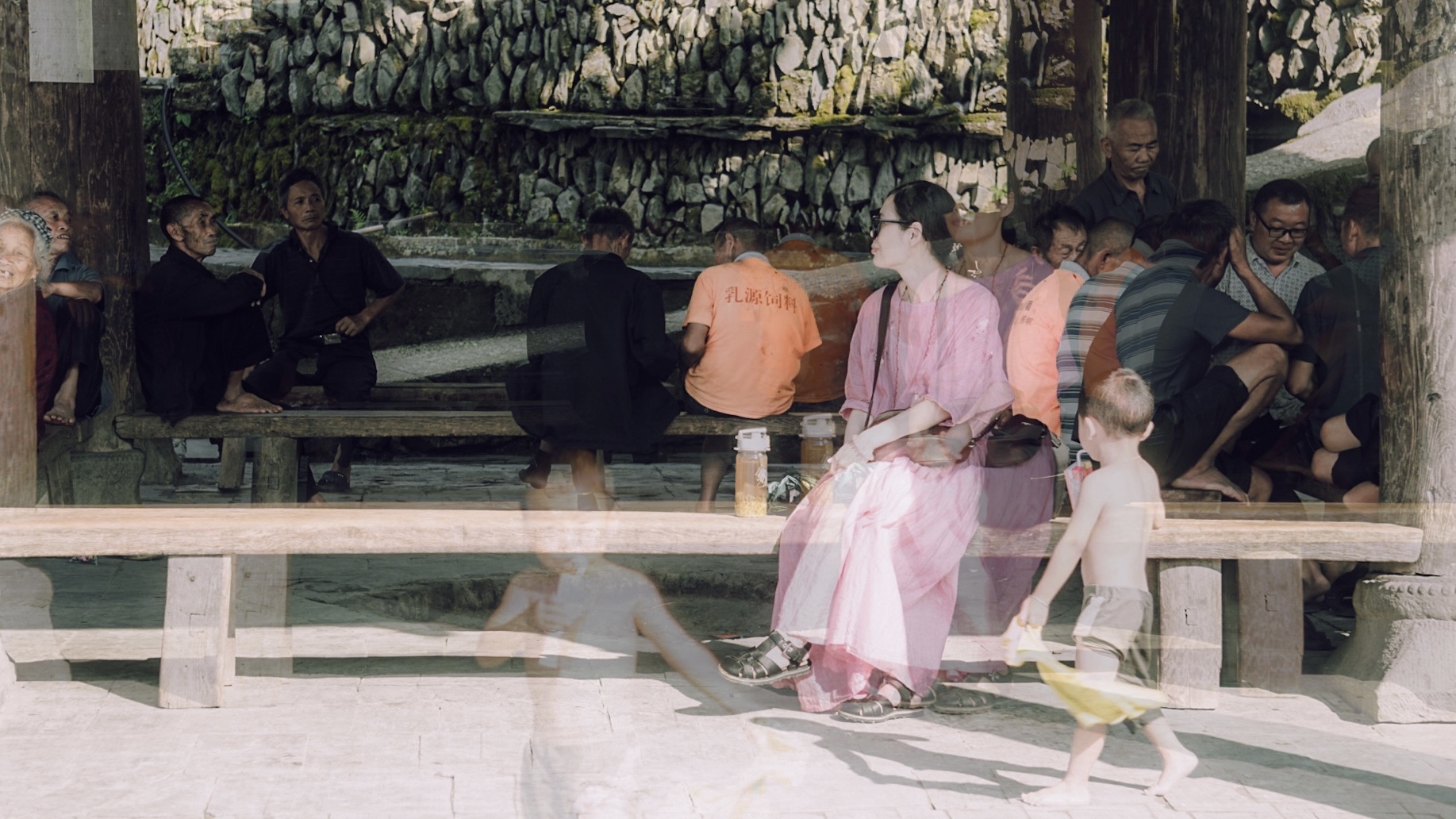
几个半裸的小孩在楼前水池边角力,津津有味地玩着自创的游戏。我从嘈杂的村民中穿过,漫步踱向建在鼓楼后陡坡上供奉神明的萨堂。萨堂边神树的荧荧树影下,一位妇女悠闲地坐在石阶上,弹奏着不知名的弦乐器,随着这远自太古的旋律放声唱起质朴的歌谣。当我小心翼翼走下长满苔藓的萨堂前台阶时,她停下了节奏悠扬的唱诵,微笑着看向我,笑容中潜藏着奇异的沉静,仿佛侗家的精灵一瞬间附上她身,歆享着她用音乐献上的供养。
Several half-naked kids were wrestling hard by the pond nearby and playing self-made games with great vigor. Stepping through the clamorous village panorama, I walked close to Satang (the shrine for the village god) constructed on the steep terrace behind the drum tower. In the flickering shade of the Holy Tree adjacent to the shrine, a lady was cozily sitting on the stone steps, playing the unknown string instrument while singing in an unadorned voice along with the immemorial melodies. As I attempted to climb onto the mossy steps to Satang, she paused her rhythmic ballad and smiled at me with exotic aplomb, as if the eudemon had evanescently possessed her and her musical worship.
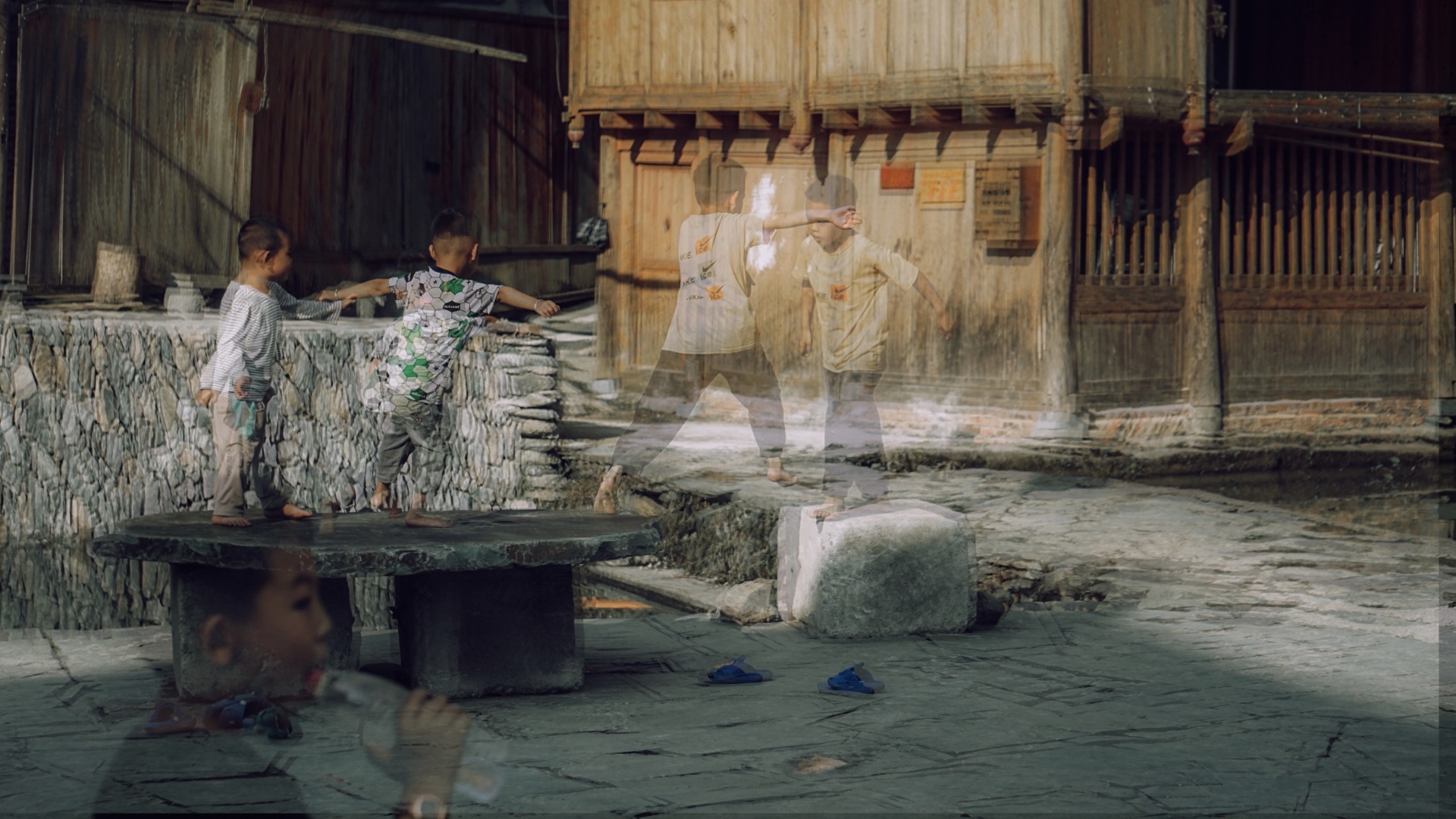
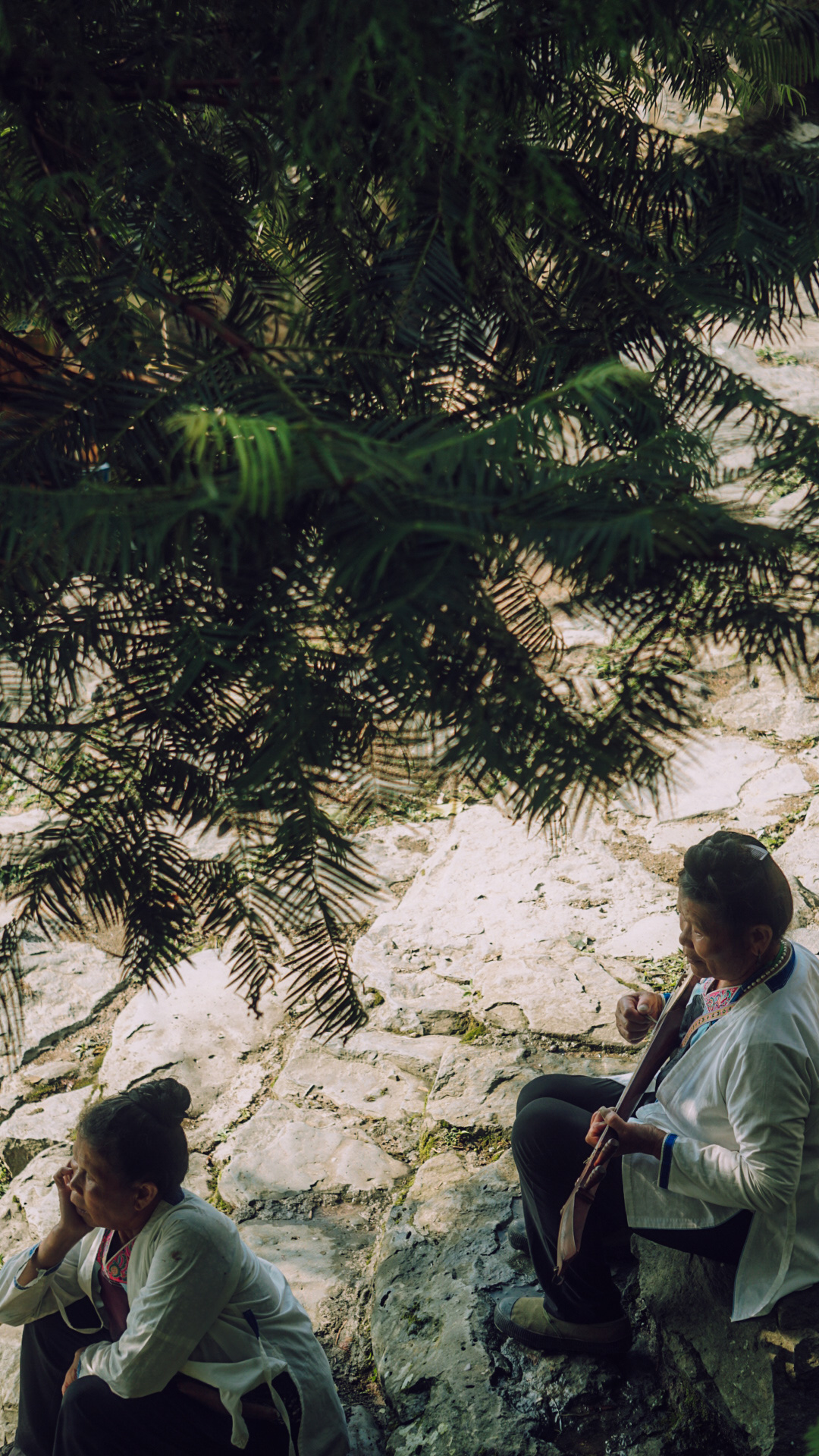
在主流官方的中国文化(尤其是汉文化)的边境上,我邂逅了一套仍被当地少数民族独自尊崇和践行的深奥系统。这些本地人半隔绝于扰攘的世俗之外,将普世的旅游业规则、消费主义圭臬、交通方式和技术手段化用在他们悠久的生活模式中。我深深陶醉于这「地方」与「现代」之间精微细腻的动态机制,它奇妙地保护当地村寨不沦为纯粹商业化的古镇,继续维持着恒久的活力。在精巧的现实之上,这些边地风土人情又将走向怎样的发展轨迹?
On the fringe of mainstream and formalized Chinese culture (in most cases also known as Han culture), I met with a suite of esoteric systems that were exclusively practiced and conformed by endemic minorities. Semi-isolated from the hustling and bustling mundanity, the locals are acclimating the cosmopolitan principle of tourism, consumerism, mobility and technology to their long-established life patterns. I am deeply captivated by the subtle and delicate dynamics operated between the locality and modernity, which interestingly retains the regional vitality as opposed to innumerable regrettably commercialized settlements. Upon the delicacy of the status quo, whereabouts will the future of these marginal landscapes and lifescapes be?
